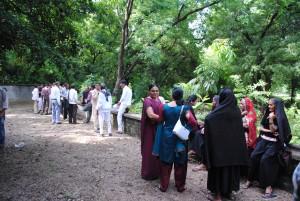
Following advocacy from AFP partner Population Foundation of India (PFI), Mr. Rigzin Samphel, Additional Executive Director, State Innovations in Family Planning Services Agency (SIFPSA), signed a letter on June 5, 2015, to establish district working groups for family planning in three districts of Uttar Pradesh: Agra, Jhansi, and Lucknow. The DWGs will advocate for family planning and provide technical support to districts in identifying gaps and solutions to improve local family planning indicators. PFI is working closely with the district authorities to orient them on formation of the groups, and its roles and responsibilities. Of the three districts, Agra was the first to establish its DWG on June 11, 2015. The formation of DWGs in Jhansi and Lucknow is currently underway.
Population Foundation of India (PFI) achieved this win after strong advocacy and follow-up. PFI held initial discussions with SIFPSA in February 2015 to describe the successes DWGs in Indonesia have had in improving family planning access, and the possible role these groups can play in Uttar Pradesh.
PFI developed and shared a concept note with SIFPSA, outlining objectives and roles for DWGs within the local context. SIFPSA and PFI worked together to strengthen the objectives and identify key areas of work, members, responsibilities, and outcomes. After reviewing family planning and health system-related indicators for strong and poorly performing districts, PFI and SIFPSA mutually decided on Agra, Jhansi, and Lucknow for the pilot.
To ensure establishment of the DWGs, Mr. Samphel sent an official letter to each district’s chief medical officer and District Magistrate/Chairman of District Health Society with a copy to the Executive Director, SIFPSA (see attached). PFI has initiated collaboration with district level SIFPSA representatives and district health authorities to support the establishment of the DWGs. Having PFI as a member of the groups will help leverage opportunities for advocacy and improve family planning conditions.
As a starting point, an AFP SMART facilitation will be conducted at the district level to identify priority areas and objectives. Additionally, PFI plans to identify and cultivate a pool of family planning champions in these districts. Having a formal technical group that consists of representatives from different sectors will amplify the advocacy efforts and provide much-needed attention to family planning. Based on the progress and success in these three pilot districts, PFI will advocate for additional DWGs in other districts.

